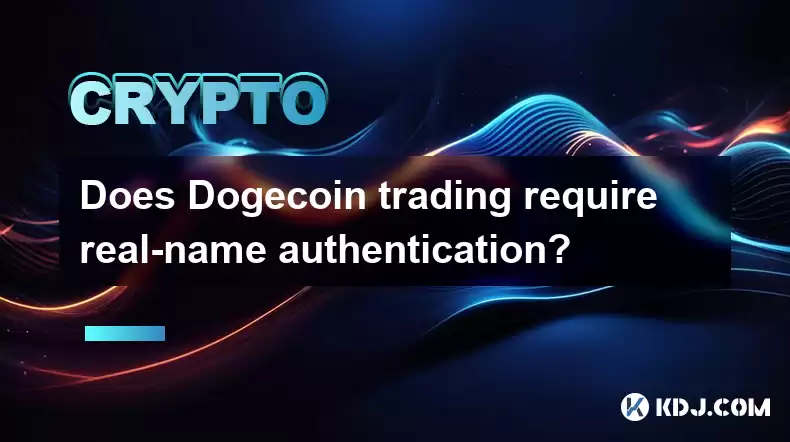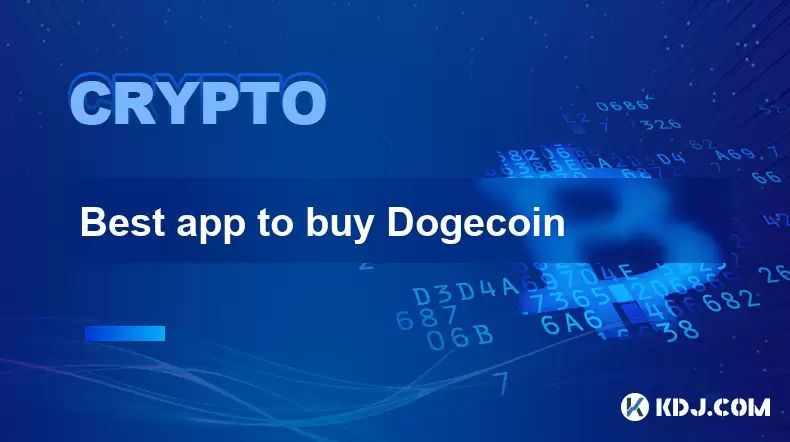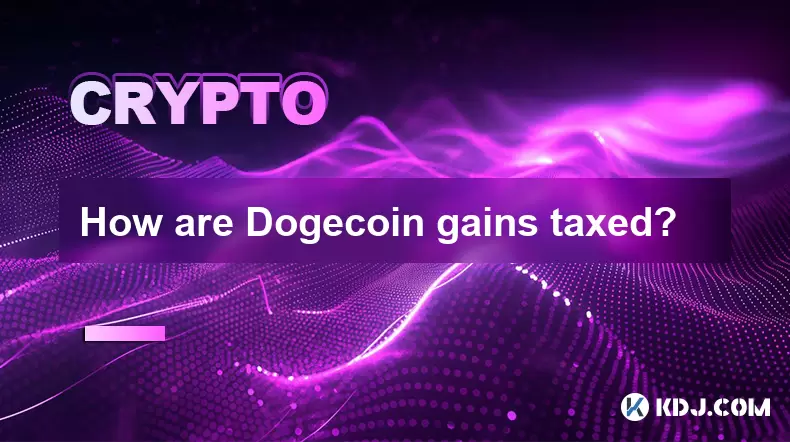-
 bitcoin
bitcoin $87959.907984 USD
1.34% -
 ethereum
ethereum $2920.497338 USD
3.04% -
 tether
tether $0.999775 USD
0.00% -
 xrp
xrp $2.237324 USD
8.12% -
 bnb
bnb $860.243768 USD
0.90% -
 solana
solana $138.089498 USD
5.43% -
 usd-coin
usd-coin $0.999807 USD
0.01% -
 tron
tron $0.272801 USD
-1.53% -
 dogecoin
dogecoin $0.150904 USD
2.96% -
 cardano
cardano $0.421635 USD
1.97% -
 hyperliquid
hyperliquid $32.152445 USD
2.23% -
 bitcoin-cash
bitcoin-cash $533.301069 USD
-1.94% -
 chainlink
chainlink $12.953417 USD
2.68% -
 unus-sed-leo
unus-sed-leo $9.535951 USD
0.73% -
 zcash
zcash $521.483386 USD
-2.87%
Does Dogecoin trading require real-name authentication?
Real-name authentication for Dogecoin trading varies by platform and jurisdiction; centralized exchanges usually require it, while some decentralized ones may not.
Apr 17, 2025 at 11:14 am

Does Dogecoin Trading Require Real-Name Authentication?
Trading cryptocurrencies, including Dogecoin, has become increasingly popular over the years. One of the common questions among new traders is whether trading Dogecoin requires real-name authentication. The answer varies depending on the platform and the jurisdiction you are trading in. Let's delve into the specifics of real-name authentication requirements for Dogecoin trading.
Understanding Real-Name Authentication
Real-name authentication is a process where users are required to provide their real identity, usually through government-issued identification documents, to a trading platform. This is often part of the Know Your Customer (KYC) and Anti-Money Laundering (AML) compliance measures that many platforms implement to prevent fraud and illegal activities.
Real-Name Authentication on Centralized Exchanges
Centralized exchanges (CEXs) are platforms where users trade cryptocurrencies through a third party that holds their funds. Most reputable centralized exchanges require real-name authentication to comply with regulatory standards. For instance, exchanges like Coinbase, Binance, and Kraken mandate KYC procedures, which include real-name verification.
- To register on a centralized exchange and trade Dogecoin, follow these steps:
- Visit the exchange's website and click on the 'Sign Up' or 'Register' button.
- Fill in your personal details such as your name, email address, and create a password.
- You will receive a verification email. Click on the link provided to verify your email address.
- Once your email is verified, log in to your account.
- Navigate to the KYC section, usually found under 'Account Settings' or 'Verification.'
- Upload a clear image of your government-issued ID (such as a passport, driver's license, or national ID card).
- In some cases, you may also need to submit a selfie holding your ID to confirm your identity.
- After submission, wait for the exchange to review and approve your documents. This can take anywhere from a few minutes to several days, depending on the platform.
Once your identity is verified, you can proceed to deposit funds and start trading Dogecoin.
Real-Name Authentication on Decentralized Exchanges
Decentralized exchanges (DEXs) operate without a central authority, allowing users to trade directly with one another. The requirement for real-name authentication on DEXs varies. Some DEXs do not require any KYC, while others might have optional or tiered KYC processes.
- To trade Dogecoin on a decentralized exchange that does not require KYC, follow these steps:
- Visit the DEX's website or connect to their platform through a compatible wallet.
- If necessary, create a new account or connect your existing cryptocurrency wallet.
- Fund your wallet with the necessary cryptocurrencies, which may include Dogecoin or other tokens used for trading on the platform.
- Navigate to the trading interface and select Dogecoin as the asset you wish to trade.
- Execute your trades directly from your wallet without needing to submit personal identification.
However, some DEXs might offer enhanced features or higher trading limits if you complete KYC. In such cases, the process would be similar to that on centralized exchanges.
Jurisdictional Differences
The requirement for real-name authentication can also vary based on the jurisdiction you are trading from. Some countries have stricter regulations that mandate all cryptocurrency exchanges to implement KYC and AML procedures, while others have more lenient rules.
- In countries with strict regulations:
- All exchanges, both centralized and decentralized, are likely to require real-name authentication to comply with local laws.
- You will need to provide your identification documents regardless of the type of exchange you use.
- In countries with more lenient regulations:
- You might find decentralized exchanges that do not require any KYC.
- However, even in these jurisdictions, centralized exchanges will typically still require real-name authentication.
The Impact of Real-Name Authentication on Privacy
One of the concerns for many cryptocurrency users is privacy. Real-name authentication can be seen as a trade-off between privacy and security. While it helps prevent fraud and ensures a safer trading environment, it also means that your personal information is stored by the exchange.
- To protect your privacy while trading Dogecoin:
- Use strong, unique passwords for your exchange accounts and enable two-factor authentication (2FA).
- Be cautious about the information you share online and use secure internet connections.
- Consider using decentralized exchanges that do not require KYC if privacy is a major concern for you.
Conclusion on Dogecoin Trading and Real-Name Authentication
In summary, whether trading Dogecoin requires real-name authentication depends on the type of exchange and the regulatory environment of your jurisdiction. Centralized exchanges almost always require it, while decentralized exchanges may vary. Always research the specific requirements of the platform you intend to use before starting to trade.
Frequently Asked Questions
Q1: Can I trade Dogecoin anonymously on any platform?A1: Yes, some decentralized exchanges allow anonymous trading without requiring real-name authentication. However, the availability of such platforms can depend on your jurisdiction and the specific exchange's policies.
Q2: What happens if I fail to complete KYC on a centralized exchange?A2: If you fail to complete KYC on a centralized exchange, you will typically be restricted from depositing, withdrawing, or trading. Some exchanges may allow limited trading with unverified accounts, but with significant limitations.
Q3: Is it safe to provide my personal information to cryptocurrency exchanges?A3: While no platform is completely immune to data breaches, reputable exchanges take significant measures to protect user data. Always choose well-established exchanges and follow best practices for securing your personal information.
Q4: Can I use a VPN to trade Dogecoin on platforms that require KYC?A4: Using a VPN might allow you to access platforms from different jurisdictions, but it does not exempt you from the KYC requirements of those platforms. You will still need to provide your personal information for verification.
Disclaimer:info@kdj.com
The information provided is not trading advice. kdj.com does not assume any responsibility for any investments made based on the information provided in this article. Cryptocurrencies are highly volatile and it is highly recommended that you invest with caution after thorough research!
If you believe that the content used on this website infringes your copyright, please contact us immediately (info@kdj.com) and we will delete it promptly.
- Blockchains, Crypto Tokens, Launching: Enterprise Solutions & Real Utility Steal the Spotlight
- 2026-01-31 12:30:02
- Crypto Market Rollercoaster: Bitcoin Crash Recovers Slightly Amidst Altcoin Slump and Lingering Fear
- 2026-01-31 13:10:01
- Solana's Stumble and APEMARS' Rise: Crypto Investors Navigate Volatile Markets
- 2026-01-31 13:05:01
- Bitcoin Options Delta Skew Skyrockets, Signaling Intense Market Fear Amidst Volatility
- 2026-01-31 13:00:02
- Cardano Secures Tier-One Stablecoin: USDCX Arrives Amidst Global Regulatory Push
- 2026-01-31 13:00:02
- A Shining Tribute: Oneida Woman, Washington's Army, and the New $1 Coin
- 2026-01-31 12:55:01
Related knowledge

Bitcoincoin burning mechanism
Jul 20,2025 at 09:21pm
What is the Dogecoin burning mechanism?The Dogecoin burning mechanism refers to the process of permanently removing DOGE tokens from circulation by se...

How to earn free Bitcoincoin?
Jul 19,2025 at 10:08pm
What is Dogecoin and Why Earn It?Dogecoin (DOGE) started as a meme-based cryptocurrency in 2013 but has grown into a widely recognized digital asset. ...

Is Coinbase a good wallet for Bitcoincoin?
Jul 19,2025 at 04:42pm
Understanding Coinbase as a Wallet Option for DogecoinWhen considering where to store Dogecoin, Coinbase is often mentioned as a potential option due ...

How to buy Bitcoincoin with PayPal?
Jul 23,2025 at 06:57am
Understanding the Basics of Buying DogecoinBefore diving into the process of buying Dogecoin with PayPal, it’s essential to understand what Dogecoin i...

Best app to buy Dogecoin
Jul 23,2025 at 03:08pm
What Is a Cryptocurrency Exchange and How Does It Work?A cryptocurrency exchange is a digital marketplace where users can buy, sell, or trade cryptocu...

How are Dogecoin gains taxed?
Jul 25,2025 at 07:01am
Understanding the Taxation of Dogecoin GainsWhen it comes to Dogecoin (DOGE), many investors are drawn to its meme-inspired branding and volatile pric...

Bitcoincoin burning mechanism
Jul 20,2025 at 09:21pm
What is the Dogecoin burning mechanism?The Dogecoin burning mechanism refers to the process of permanently removing DOGE tokens from circulation by se...

How to earn free Bitcoincoin?
Jul 19,2025 at 10:08pm
What is Dogecoin and Why Earn It?Dogecoin (DOGE) started as a meme-based cryptocurrency in 2013 but has grown into a widely recognized digital asset. ...

Is Coinbase a good wallet for Bitcoincoin?
Jul 19,2025 at 04:42pm
Understanding Coinbase as a Wallet Option for DogecoinWhen considering where to store Dogecoin, Coinbase is often mentioned as a potential option due ...

How to buy Bitcoincoin with PayPal?
Jul 23,2025 at 06:57am
Understanding the Basics of Buying DogecoinBefore diving into the process of buying Dogecoin with PayPal, it’s essential to understand what Dogecoin i...

Best app to buy Dogecoin
Jul 23,2025 at 03:08pm
What Is a Cryptocurrency Exchange and How Does It Work?A cryptocurrency exchange is a digital marketplace where users can buy, sell, or trade cryptocu...

How are Dogecoin gains taxed?
Jul 25,2025 at 07:01am
Understanding the Taxation of Dogecoin GainsWhen it comes to Dogecoin (DOGE), many investors are drawn to its meme-inspired branding and volatile pric...
See all articles





















![Ultra Paracosm by IlIRuLaSIlI [3 coin] | Easy demon | Geometry dash Ultra Paracosm by IlIRuLaSIlI [3 coin] | Easy demon | Geometry dash](/uploads/2026/01/31/cryptocurrencies-news/videos/origin_697d592372464_image_500_375.webp)




















































